Apple Inc (NASDAQ:AAPL) is starting to look mortal as well. It is still up 55% this year- and it began 2012 as a company worth over $350 billion- but after briefly hitting $700 in September the stock has slipped to about $640. There are a number of factors behind this- end-of-quarter profit taking, disappointing iPhone 5 sales, recognition that Google Inc (NASDAQ:GOOG) is a significant player in the tablet and smartphone markets (Google is up 10% since the beginning of September, while Apple is down 4%), and possibly most of all the realization that the death of Steve Jobs means that the company may never create another transformative, company-defining product as the iPod, iPhone, and iPad all were.
We think that could hurt Apple Inc (NASDAQ:AAPL) in the “trillion dollar wars” as the race to a market capitalization of $1 trillion is being called, but the company is not necessarily a bad value. It currently trades at 15 times trailing earnings and pays a 1.6% dividend yield. If you were told those two facts about a company, what growth rate would be necessary to make you consider it as a value stock? Much lower than the 21% earnings growth rate Apple delivered last quarter compared to a year earlier, that’s for sure. Looking at it in another way, Apple Inc (AAPL) only trades at 12 times forward earnings estimates. If it reaches that point and then becomes a low-to-no-growth company, it would probably be about fairly valued today. And despite stiff competition from Google and other companies, we think it’s rather pessimistic to predict that Apple Inc (AAPL) won’t be able grow much at all beyond that point when it is in such attractive product markets. In other words, with a five-year PEG ratio of 0.6 there is a lot of space to be more bearish than Wall Street analysts but also consider Apple to be a good value, and that’s exactly where we would place ourselves.
Apple Inc (NASDAQ:AAPL)was also the most popular stock among hedge funds during the second quarter of the year by a good margin (see our full rankings), and while at least some degree of broad ownership would be expected for such a large cap stock we like to see that notable investors own it as well. Tiger Cub Rob Citrone’s Discovery Capital Management had over $1 billion invested in the stock as of the end of June; the 2 million shares of Apple Inc (NASDAQ:AAPL) represented over 20% of the fund’s 13F portfolio (find more stocks from Discovery Capital Management).
We’ve already mentioned Google, which is currently at a market cap of about $250 billion. Google’s earnings growth in its most recent quarter was actually lower than Apple’s as it turned in an 11% increase based off a 35% increase in revenue. The market believes that it has much better growth prospects, and so Google trades at 22 times trailing earnings and 15 times estimated 2013 earnings. We can see Google getting better growth over the next several years, but this is probably a bit too high a premium over Apple Inc (NASDAQ:AAPL). The frenzied Microsoft Corporation (NASDAQ:MSFT) is also a competitor; it has about the same market valuation as Google, and pays a 3.1% dividend yield. Growth and valuation are complicated questions with Microsoft. Its forward P/E is 9 and its growth last quarter was quite low, but both of those factors are likely partly caused by the impending release of new versions of Windows and Office (and lower sales as customers anticipate the new releases). If sales numbers impress, it could deserve consideration as a value stock.
We’d also look at Amazon.com, Inc. (NASDAQ:AMZN) and Research In Motion Limited (NASDAQ:RIMM) as competitors. There’s a pretty big difference between these two companies: Research in Motion is not expected to be profitable this year or next year, while Amazon’s relatively low profits don’t stop the market from giving it a valuation of $116 billion (111 times expected earnings for next year). Even looking out long-term, Amazon’s five-year PEG ratio is 111. Despite revenue growth of 30% and a number of intriguing business initiatives, we don’t think it’s a buy. Read our recent evaluation of Amazon. Research in Motion saw its revenue decline 31% last quarter compared to the same period in 2011, keeping it unprofitable, and is desperately in need of either a turnaround or being acquired as the once-dominant Blackberry has been displaced among its critical professional base.
We’re not wildly optimistic on Apple Inc (NASDAQ:AAPL). However, we still think that it is a market leader in very attractive businesses and that it trades at a fairly low multiple given its current earnings and realistic growth expectations.
Disclosure: No positions in Apple Inc (NASDAQ:AAPL) or other stocks mentioned in this article.






